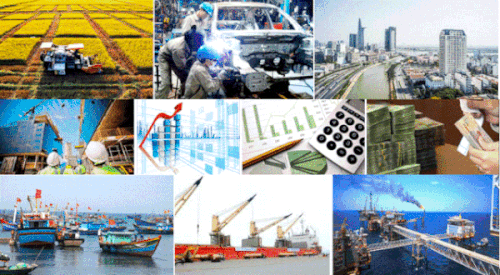(VOVWORLD) - The Vietnam Socio-Economic Forum 2022 themed “Reinforcing macro-economic foundation, promoting sustainable recovery and development” was held in Hanoi last weekend. The forum delivered a message about Vietnam’s consistent priorities of strengthening the macro economy, resilience, and self-reliance.
 Vietnam is consistent in ensuring macro-economic stability Vietnam is consistent in ensuring macro-economic stability |
Vietnam’s macro-economy is under control
Despite economic stagnation and high inflation globally, Vietnam has seen relatively high growth and low inflation. The Vietnamese economy has great openness with total import-export value predicted to reach 750 billion USD, two times GDP. Indexes for the economy’s resilience, adaptation, and self-reliance are relatively good despite the pandemic and natural disasters.
Though the pressure on the macro economy is huge, Vietnam has effectively controlled it. Prestigious rating companies have raised their ratings for Vietnam. The World Bank, the International Monetary Fund, and the Asian Development Bank forecast Vietnam’s GDP growth in 2022 to be 6.7% to 7.5% with inflation below 4%.
In 2022, Vietnam adopted a number of unprecedented fiscal policies. Tax reduction and fiscal support and aid packages for businesses and workers have stabilized the macro-economy and generated jobs. Vietnam’s forecasts, analyses, solutions, and macro policies have proved effective.
Director of the HCM National Academy of Politics Nguyen Xuan Thang said: 'Contrary to the global downturn, Vietnam’s economy overcame its most difficult period caused by the COVID-19 pandemic to maintain its growth and macro-economic stability, effectively control inflation, and ensure major economic balances, and anticipates strong growth this year."
Key to Vietnam’s sustainable growth
Stabilizing the macro economy and promptly, flexibly responding to change are the keys to Vietnam’s recovery and growth despite fluctuations around the world. Once macro indexes are stable, the economy will recover quickly.
According to Mr. Thang, freeing up resources and expanding growth should be the new approach to recovery and sustainable development. He said it’s necessary to focus on fine-tuning the legal and institutional framework for the management of land and the real estate market in order to effectively utilize the most important resource of the economy.
Minister of Natural Resources and Environment Tran Hong Ha said: "It’s important to renew methods and manners of allocating land to ensure fairness and equality between the parties involved and settle land use needs and land related issues. We need to narrow the gap between land pricing and land finance. Proper pricing will help implement other social policies. And we need to promote digital transformation to keep track of land data."
Stock, business bond, government bond, monetary, and real estate markets are the lifeblood of the economy and need to be developed soundly and sustainably. Nguyen Duc Chi, the Deputy Minister of Finance says the Ministry has worked out orientations and directions to make corporate bonds a channel for medium-term and long-term capital mobilization.
"It’s necessary to fine-tune the legal framework and laws concerning the issuance of corporate bonds and mobilizing capital like the Law on Enterprises and the Law on Securities. Three issues to be reported to the NA are conditions for businesses to offer bonds, conditions for investors to invest in corporate bonds, and the forms of issuing individual bonds and other bonds to the public. We also need to diversify and improve corporate bond investment and improve the quality of the intermediary financial institutions who are involved in issuing corporate bond," said Mr. Chi.
In the long term, strengthening the macro-economy means removing bottlenecks to help the economy run smoothly, give businesses confidence in making business and investment decisions, boost the market and effectively exploit resources.
Lessons learned from 35 years of national renewal and difficult periods like the pandemic show that macro-economic stability is the key to surviving global economic changes.